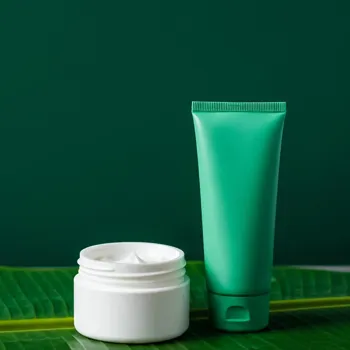Unlocking the Beauty Debate: Natural vs. Synthetic Cosmetics - Delve into the pros and cons to make your beauty choices wise
In a world increasingly conscious of what we put in and on our bodies, the debate
between natural and synthetic cosmetics is hotter than a Mumbai summer. From fairness creams to kajal, Indian consumers are demanding more transparency and understanding the potential impacts of their beauty choices.

This article dives deep into the advantages and disadvantages of both types of cosmetics, helping you make informed decisions for your skin and the environment.
Rising demand for natural cosmetics emphasizes safety and sustainability
Natural cosmetics, derived from plants, minerals, and other naturally occurring sources, are gaining popularity for their perceived gentleness and eco-friendliness.

These products often champion ingredients like aloe vera, turmeric, sandalwood, neem, and rosewater – staples in traditional Indian beauty rituals. The appeal lies in the notion that what comes from nature is inherently safer and better for the skin.
Moreover, many natural brands highlight their commitment to sustainable sourcing and cruelty-free practices, resonating with ethical consumers. However, it's important to remember that "natural" doesn't automatically equate to "safe" for everyone.
Synthetic cosmetics balance safety and efficacy concerns
Synthetic cosmetics, on the other hand, utilize lab-created ingredients. These ingredients are often produced to enhance stability, extend shelf life, and achieve specific textures or colors that might be challenging to attain with purely natural sources.

Scientists and cosmetologists formulate these products to target specific skin concerns, like wrinkles, acne, or hyperpigmentation, with potentially higher efficacy and quick results.
Synthetic formulations often undergo rigorous testing to ensure safety and efficacy, addressing concerns about allergic reactions or harmful side effects.
However, some synthetic ingredients have raised concerns regarding long-term health impacts and environmental pollution, leading consumers to question their safety. The debate lies there, safety vs efficacy, a challenge to balance.
Benefits of natural cosmetics for sensitive skin: soothing, anti-inflammatory, gentle ingredients
One of the primary benefits of natural cosmetics is their reduced risk of irritation for individuals with sensitive skin. Ingredients like aloe vera and chamomile possess soothing and anti-inflammatory properties, making them suitable for those prone to redness, itching, or allergic reactions.

The absence of harsh chemicals, parabens, and artificial fragrances, commonly found in synthetic cosmetics, further minimizes the likelihood of adverse reactions. Many natural brands also prioritize using gentle preservatives, ensuring product safety without compromising skin health.
Natural cosmetics have drawbacks: shorter shelf life, inconsistent efficacy, potential allergies
However, natural cosmetics are not without their drawbacks. They tend to have a shorter shelf life compared to their synthetic counterparts, as natural ingredients are more susceptible to degradation.

The efficacy, too, can be less consistent due to variations in the quality and concentration of natural extracts. Some individuals may be allergic to certain plant-based ingredients, highlighting the importance of patch-testing new products regardless of their "natural" label.
Synthetic cosmetics offer superior performance and longevity
Synthetic cosmetics offer several advantages in terms of performance and longevity. Lab-created ingredients can be precisely formulated to target specific skin concerns with greater accuracy and efficiency.

Synthetic antioxidants and preservatives enhance the product's stability, preventing spoilage and ensuring a longer shelf life. Moreover, synthetic makeup products often provide superior pigmentation, coverage, and wear-time, making them popular among consumers who prioritize these qualities.
The key here, is to understand which ingredients have been properly tested, and are generally safe.
Natural Cosmetics Benefits
Gentleness, reduced ingredient list, safety, sustainability

Natural Cosmetics Disadvantages
Shorter shelf life, inconsistent efficacy, some allergenic substances

Synthetic Cosmetics Benefits
Targeted effects, long lasting, enhanced pigments, safety tested by reputed firms.

Synthetic Cosmetics Disadvantages
Health impact questionable, environmental impact questionable, harsh chemicals, preservatives can harm

Cosmetic choice based on preferences, skin type, values; natural vs synthetic
Ultimately, the choice between natural and synthetic cosmetics depends on individual preferences, skin type, and values.

Those with sensitive skin or a strong commitment to sustainability may lean towards natural options, while others may prioritize the efficacy and longevity offered by synthetic formulations.
Reading ingredient labels carefully, conducting patch tests, and researching brands are crucial steps in making informed decisions.
Consumer education on cosmetic ingredients and safety is crucial
Education is key. Consumers need to be aware of the specific ingredients in their cosmetics, whether natural or synthetic, and any potential risks associated with them.

Regulatory bodies play a crucial role in ensuring the safety and accuracy of cosmetic labeling, preventing misleading claims and protecting consumers from harmful ingredients.
Public awareness campaigns can further educate individuals about the benefits and risks of different cosmetic options, empowering them to make choices that align with their health and ethical values.
Balancing natural and synthetic skincare for future sustainability
The ideal approach may involve incorporating elements from both categories, using natural products for daily skincare while relying on synthetic cosmetics for specific needs like sun protection or long-lasting makeup looks.

As technology advances, we can expect to see the development of more sustainable and eco-friendly synthetic ingredients, bridging the gap between natural and synthetic cosmetics.
Personal choice: natural vs. synthetic cosmetics impact health, well-being, environment
In conclusion, the choice between natural and synthetic cosmetics is a personal one, influenced by individual needs, preferences, and values.

By understanding the benefits and drawbacks of both categories, consumers can make informed decisions that prioritize their health, well-being, and the environment.
AI Generated Content. Glance/InMobi shall have no liability for the content












